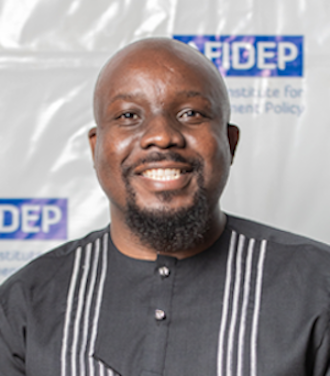
Dr. Ndlovu serves as a Research and Policy Analyst at the African Institute for Development Policy (AFIDEP) where he works as the Anglophone Africa Project Manager (Africa Integrity Indicators project) and . He received a PhD in Governance and Regional Integration from the Pan African University-African Union Commission (PAU-GHSS), Yaoundé, Cameroon in 2021. He received a Masters of Science in Development Studies from the National University of Science and Technology in Bulawayo, Zimbabwe.
During his residency at the University of Chicago, Dr. Ndlovu will work on his project: Gender, Democracy and Authoritarianism: An Analysis of Women’s Representation in Divergent Political Regimes in Africa.
Analysing the cumulative findings of the Africa Integrity Indicators on gender for the 10 best performing countries, this paper puts the above hypotheses to the test. The ten countries: Rwanda, South Africa, Angola, Uganda, Tanzania, Seychelles, Burundi, Zimbabwe, Carbo Verde and Kenya are of various regime types ranging from liberal democracies to outright authoritarian regimes. The paper analyses the peculiar factors driving gender balance in each context while also drawing on key informant interviews and decolonial review of literature to sieve out possible novel practices of interest to international gender norms.
Recent Research / Recent Publications
Election observation is one practice that is now a common feature in the electoral democracy realm of Africa, and it commenced with Zimbabwe’s 1980 independence elections. Two decades later, Zimbabwe gained notoriety for contested election outcomes manifesting in negative verdicts by election observer missions of all classes. At the forefront of these verdicts were mostly western missions and a perception also formed that African missions were lenient towards Zimbabwe and self-censored themselves to issue positive verdicts. Western missions came to be viewed as norm entrepreneurs while African missions are viewed as norm takers. The negative verdicts were entwined with the dramatic collapse of diplomatic relations between Zimbabwe and western powers resulting in the later imposing sanctions on the former. Using Zimbabwe as a case study, this chapter examines the extent to which the practice of election observation can be regarded as an African practice. Drawing on the conventional constructivist logic contrasted against Acharya as well as Finnemore and Sikkink’s (2013, 1998) Norm Diffusion model logic, the chapter sets out to quantify the contribution that Africa has made to election observation while also determining the willingness of African governments to subject themselves to the practice. The chapter draws from registered voters, election observers, civil society, and legislators. The findings reveal that while it is relatively true that Africa makes little contribution to election observation and does it reluctantly to access aid and investment, it has also improved dramatically in its technical prowess.
 THE UNIVERSITY OF CHICAGO
THE UNIVERSITY OF CHICAGO

